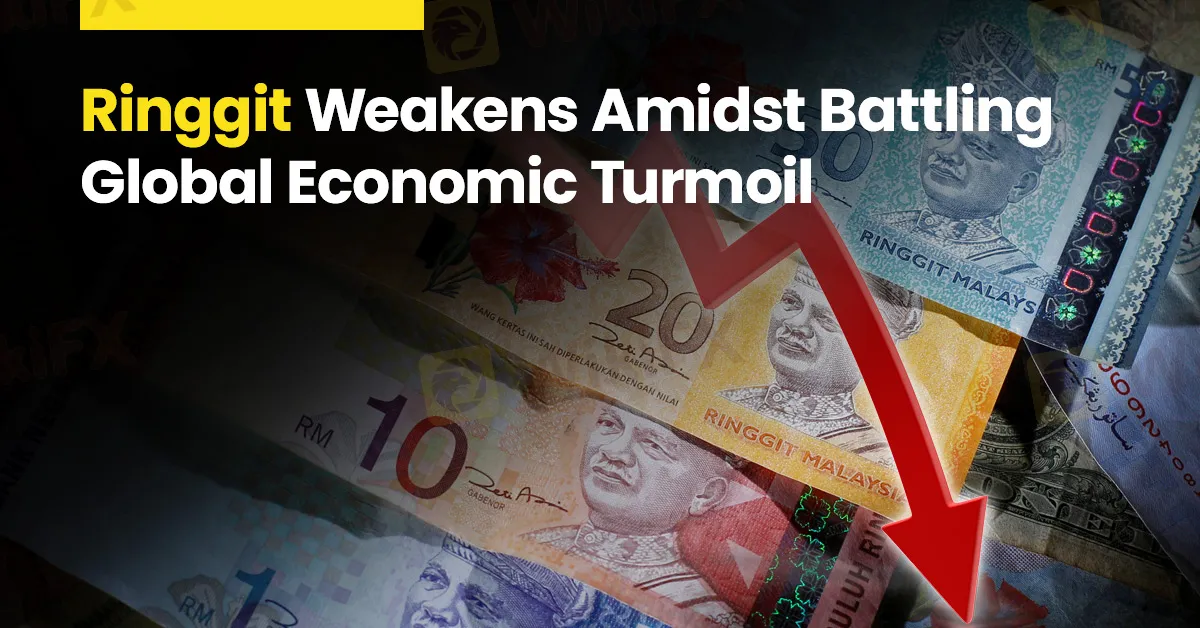Ringgit Weakens Amidst Battling Global Economic Turmoil
Abstract:On Tuesday, the ringgit dipped to a low of 4.7900 against the US dollar, driven by apprehensive investors seeking refuge in the safe haven currency amidst escalating geopolitical tensions. Over the past week, the local currency has depreciated by nearly 0.9% against the US dollar, marking its weakest performance since January 1998. In conjunction with this decline, Bank Negara Malaysia has reiterated its commitment to bolstering the ringgit.

Bank Negara Malaysia has reiterated its commitment to bolstering the ringgit, which has neared its lowest point since January 1998. The central bank pledges to maintain the smooth operation of the foreign exchange market, with assistance from government-linked entities, corporations, and exporters. Their collective efforts aim to attract inflows and enhance liquidity within the market, as stated in a release from the central bank on Monday.
On Tuesday, the ringgit dipped to a low of 4.7900 against the US dollar, driven by apprehensive investors seeking refuge in the safe haven currency amidst escalating geopolitical tensions. Over the past week, the local currency has depreciated by nearly 0.9% against the US dollar.

This scenario is not unique to Malaysia. Investors are closely monitoring emerging-market central banks, including those of China, Korea, Thailand, Poland, and Indonesia, for potential intervention, as their local currencies have been battered by the recent surge in the dollar. In comparison, the ringgit demonstrated relative resilience compared to other regional currencies like the South Korean won, Philippine peso, and Taiwanese dollar.
Malaysia's currency struggles are part of a broader trend influenced by the dollar's strength, fuelled by expectations of prolonged high interest rates by the Federal Reserve, along with safe-haven demand amid escalating tensions in the Middle East. Additionally, the subdued economic prospects for China, Malaysia's key trading partner, have exerted downward pressure on the ringgit.
In early March, Bank Negara Malaysia's announcement to encourage state-linked entities to repatriate foreign investment income and consistently convert it into the local currency helped the ringgit recover from its February lows.
Dr. Mohd Afzanizam Abdul Rashid, Chief Economist and Head of Social Finance at Bank Muamalat Malaysia Bhd, highlighted to Business Times that during times of economic uncertainty, the US dollar typically serves as a safe haven, leading forex traders to increase their allocations to it. He further elaborated that the US Federal Reserve's cautious approach towards reducing its benchmark interest rate is supported by recent economic data, such as the 0.7% month-on-month growth in Retail Sales, surpassing consensus estimates of 0.4%.
Despite these challenges, Malaysia's status as a net oil exporter could offer some relief. With Brent oil prices approaching $100 per barrel, there is still a possibility of support for the Malaysian currency from this front.

Read more

TriumphFX Scam: RM23.7M Lost in Investment Fraud Syndicate
Over RM23.7 million was lost in the TriumphFX scam. 72 police reports filed as syndicate lures victims via Zoom with 4-7% monthly returns.

T4Trade Review 2025: Live & Demo Accounts, Withdrawal to Explore
T4Trade, established in 2021 and regulated by the FSA in the Seychelles, allows trading on a modest portfolio of over 300 instruments, spanning forex, metals, indices, commodities, futures, and shares, all accessible via the popular MetaTrader 4 and their proprietary WebTrader platforms. Notably, T4Trade offers a zero-commissions pricing model where both floating and fixed spreads are offered on its MetaTrader—flexible leverage up to 1000:1 to increase trading flexibility. T4Trade also introduces a copy trading service called “TradeCopier”, which enables traders who lack experience or time to join in the markets by copying the trades of seasoned professionals.

Massive Crypto Scam in Philippines: Education Pioneer Wealth Society Exposed
Unmasking the $300M crypto scam by Education Pioneer Wealth Society in the Philippines. Learn about this pig butchering fraud and how to fight back.

WhatsApp Scam Costs Woman Rs 1.32 Crore in Trading Fraud
A 57-year-old woman in Thiruvananthapuram lost Rs 1.32 crore in an online trading scam. Learn how to avoid such scams and protect yourself.
WikiFX Broker
Latest News
Lawmakers Push New Crypto ATM Rules to Fight Fraud
2025 WikiFX Forex Rights Protection Day Preview
PH Senator Probes Love Scams Tied to POGOs
Mastering Calm: How to Stay Cool in Forex Trading?
The End of Costly USDT Transfers: Tron Reshapes Stablecoin Transactions
BP\s shareholders want it to make money, not climate policy
2025 SkyLine Guide Thailand Opening Ceremony: Jointly Witnessing New Skyline in a New Chapter
TriumphFX: The Persistent Forex Scam Draining Millions from Malaysians
Safety Alert: FCA Discloses These 11 Unlicensed Financial Websites
Why does Botbro change the domain name?
Rate Calc

